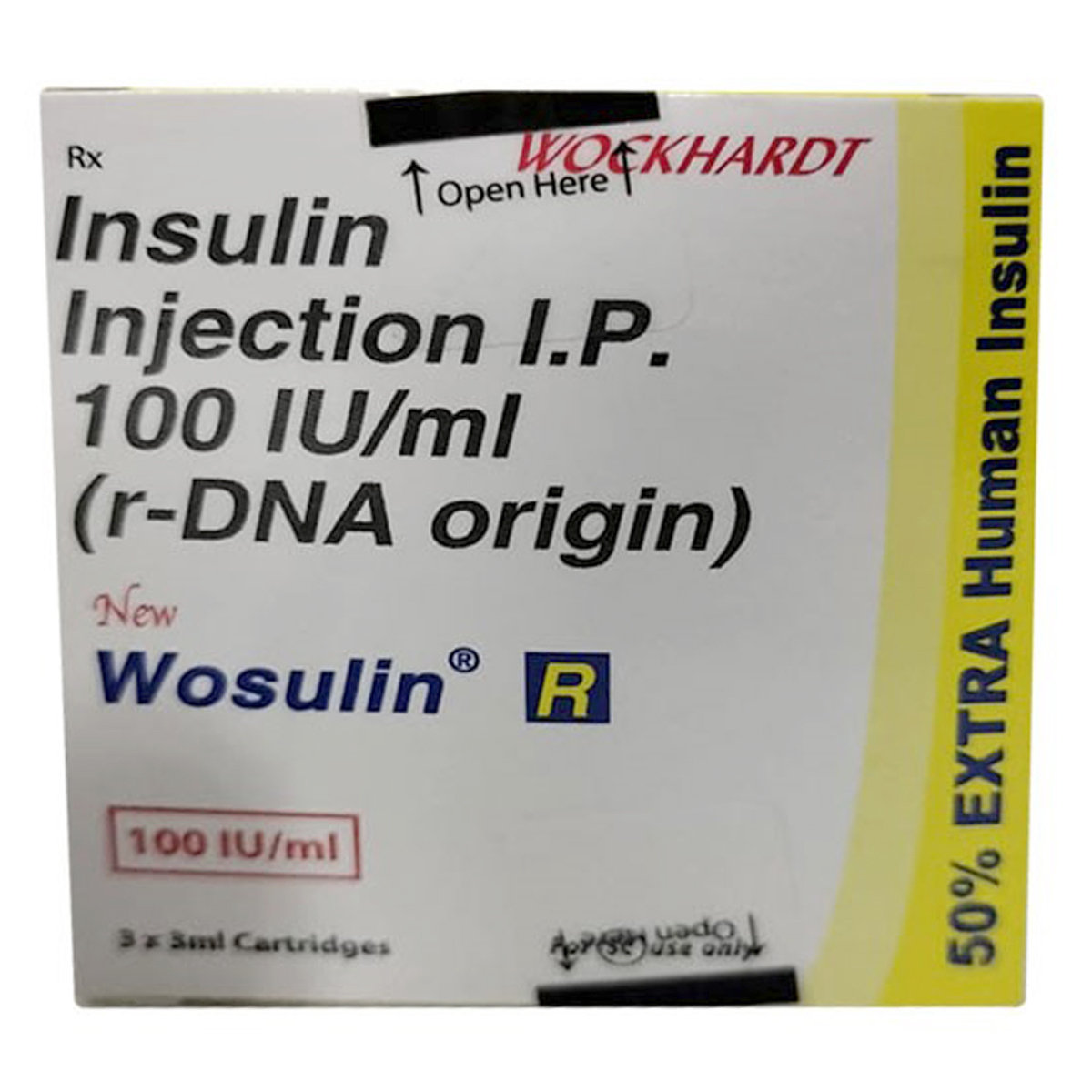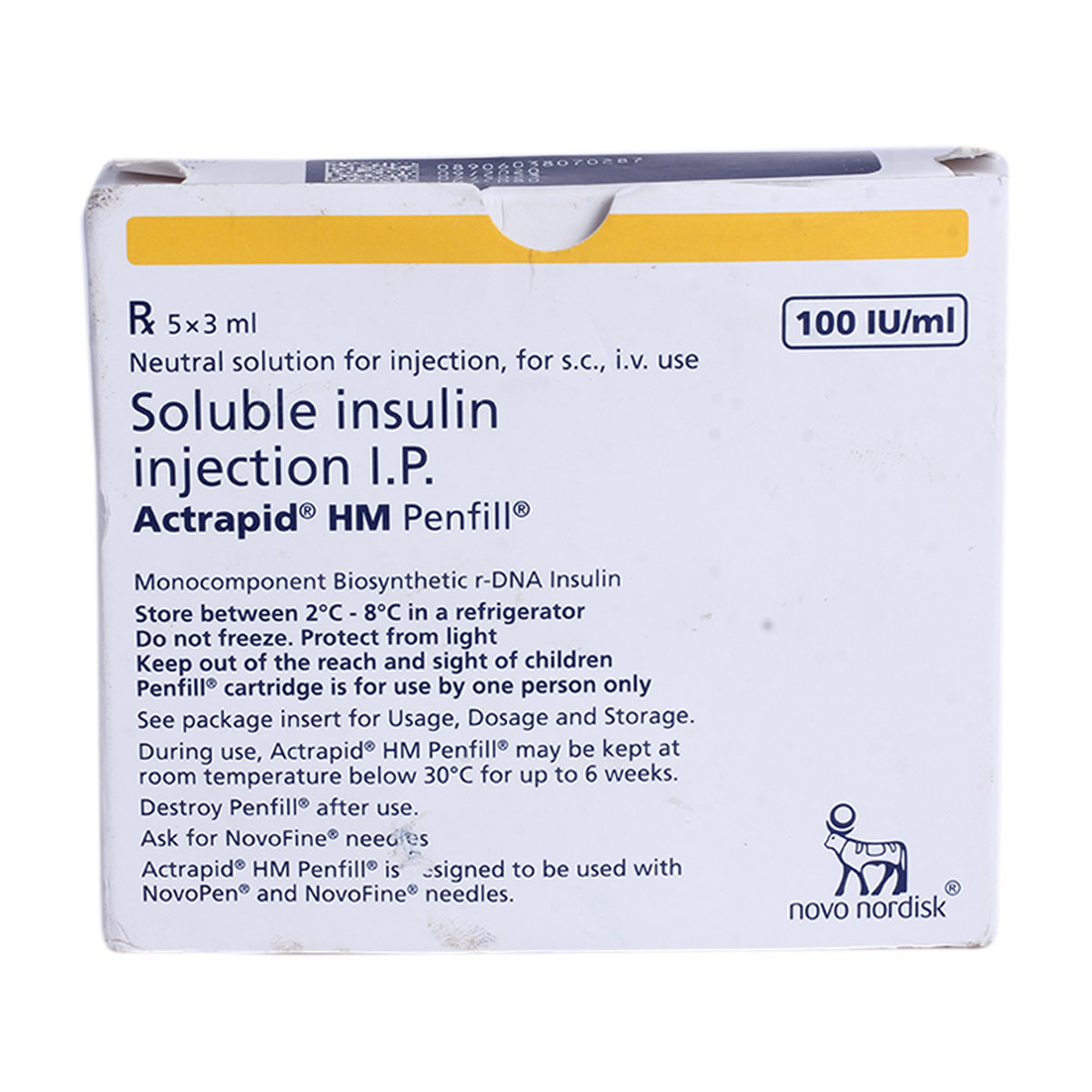Lupisulin R 100 IU Injection 10ml
MRP ₹174.83
(Inclusive of all Taxes)
₹26.2 Cashback (15%)
Provide Delivery Location
Online payment accepted
 Prescription drug
Prescription drugWhats That
Composition :
Manufacturer/Marketer :
Consume Type :
Expires on or after :
Return Policy :
About Lupisulin R 100 IU Injection
Lupisulin R 100 IU Injection is a hormone known as 'insulin' made in your pancreas, which helps your body utilize glucose (sugar) for energy. Human insulin is the name which describes synthetic insulin, which is laboratory grown to mimic the insulin in humans. Lupisulin R 100 IU Injection is a rapid-acting human insulin analogue for the treatment of diabetes mellitus in both children (above two years of age) and adults. When you have diabetes, your pancreas doesn't make any insulin; enough insulin or the insulin it makes doesn't work properly (called insulin resistance). And that's why some people with diabetes are insulin-dependent, which means they need to take it as medication. Taking insulin helps you manage your blood sugar levels.
When Lupisulin R 100 IU Injection is injected, it is extremely fast-acting and works rapidly to normalize blood sugar levels. It typically begins working after 10-20 minutes and will last for between 3 and 5 hours. Due to this short action, Lupisulin R 100 IU Injection should normally be taken in combination with intermediate-acting or long-acting insulin preparations. Lupisulin R 100 IU Injection works by ensuring rapid and consistent sugar control. Lupisulin R 100 IU Injection is a fast-acting form of insulin that helps lower blood sugar levels after food intake. Prevents the risk of having severe complications of diabetes. It stimulates the recovery of sugar in muscle and fat cells and thus suppresses sugar production in the liver.
Your doctor will advise you on how to use Lupisulin R 100 IU Injection. It should be administered at least 5-10 minutes before the meal or within 20 minutes after you start having a meal. The common side effects of Lupisulin R 100 IU Injection are hypokalaemia (low potassium), hypoglycaemia (low blood sugar level), local injection site reactions, lipodystrophy (fat deposition under the skin), rash, and pruritus (itch skin), which may occur at the injection site. Most of these side effects of Lupisulin R 100 IU Injection do not require medical attention and gradually resolve over time. However, if the side effects are persistent, reach out to your doctor.
Try not to stop taking Lupisulin R 100 IU Injection of your own. Let your doctor know about this, as it may cause withdrawal symptoms. Do not take Lupisulin R 100 IU Injection if you have any low blood glucose levels, kidney, liver, or heart problems, or problems with alcohol or other prescription recreational drugs. Along with Lupisulin R 100 IU Injection, you should take a healthy diet, exercise regularly, and maintain weight as your doctor advises. Lupisulin R 100 IU Injection is a cold chain medicine, so it must be stored in the refrigerator between 2-8 degrees Celsius; otherwise, its efficiency might get lost. Do not store it in the freezer of the fridge.
Uses of Lupisulin R 100 IU Injection
Directions for Use
Key Benefits
Lupisulin R 100 IU Injection works by ensuring rapid and consistent sugar control. Lupisulin R 100 IU Injection is a fast-acting form of insulin that helps lower blood sugar levels after food intake. Prevents the risk of having severe complications of diabetes. It stimulates the recovery of sugar in muscle and fat cells and thus suppresses sugar production in the liver. Lupisulin R 100 IU Injection helps in improving the glycaemic control, which in turn decreases the risk of progression of complications of diabetes like damage to the retina (retinopathy), damage to the kidney (nephropathy), damage to nerve cells (neuropathy), delayed wound healing, diabetic foot ulcer and others. Besides this, Lupisulin R 100 IU Injection can be safely prescribed to the diabetic mother in the pregnancy and the lactation stage.
Storage
Drug Warnings
Lupisulin R 100 IU Injection is for subcutaneous (under the skin) use only. However, some insulin forms can be given intravenously (IV) with a saline solution of 0.9%. If you are changing the brand of insulin or if you need to inject your insulin by another method, it should be done under strict medical supervision. Cases of heart failure were reported when pioglitazone was used with insulin, especially in patients at high risk of cardiac heart failure. The first symptoms of hyperglycaemia (high blood sugar level) may include symptoms like excessive thirst, dry mouth, increased frequency of urination, nausea, vomiting, drowsiness, flushed dry skin, loss of appetite and acetone odour of the breath. You should closely monitor these symptoms. Symptoms like heart failure, weight gain and oedema (fluid deposition in tissue) should not be overruled. It is advisable not to consume alcohol as it may increase or decrease your blood glucose level. Care should be taken while travelling across more than two time zones. Your doctor may adjust your insulin schedule. Lupisulin R 100 IU Injection may decrease the potassium level, leading to a state of hypokalaemia that, if left untreated, may lead to respiratory paralysis, irregular heartbeat rhythm, coma and even death. Do not take Lupisulin R 100 IU Injection if you have any low blood glucose levels, kidney, liver, or heart problems, or problems with alcohol or other prescription recreational drugs.
Diet & Lifestyle Advise
- Exercise may lower your body’s need for insulin during and for some time after the physical activity.
- Exercise may also speed up the effect of an insulin dose, especially if the exercise involves the area of injection site (for example, the leg should not be used for injection just prior to running).
- Discuss with your doctor how you should adjust your insulin regimen to accommodate exercise.
- Avoid eating sugar food and prefer food cooked food low in calories.
- When travelling across more than 2 time zones, you should talk to your doctor concerning adjustments in your insulin schedule.
Side Effects of Lupisulin R 100 IU Injection
- Hypokalaemia (low potassium)
- Hypoglycaemia (low blood sugar level)
- Local injection site reactions
- Lipodystrophy (fat deposition under the skin)
- Rash
- Pruritus (itchy skin)
- Weight gain
- Constipation
- Redness, swelling, and itching at the injection site
Habit Forming
Therapeutic Class
All Substitutes & Brand Comparisons
RX
Lupisulin M 50 (50/50) 100IU Injection 10 ml
Lupin Ltd
₹196
(₹17.64/ 1ml)
12% COSTLIERRX
Out of StockINSUMANRAPID 100I.U CARTRIDGES 5ML
Sanofi India Ltd
₹367
(₹73.4/ 1ml)
366% COSTLIERRX
Wosulin R 100IU/ml Injection 3ml
Wockhardt Ltd
₹258
(₹77.4/ 1ml)
391% COSTLIER
Author Details
We provide you with authentic, trustworthy and relevant information
FAQs
Drug-Drug Interactions Checker List
- ASPIRIN
- GLIPIZIDE
- CANAGLIFLOZIN
- SITAGLIPTIN
- FUROSEMIDE
- METFORMIN
- METOPROLOL
- LEVOTHYROXINE SODIUM
- LIRAGLUTIDE
- RESERPINE
- PROGESTERONE
- ALBUTEROL
- PENTOXIFYLLINE
- CLONIDINE
- FENOFIBRATE
- IBUPROFEN
- ESTROGEN
- FLUOXETINE
- LITHIUM
- PHENOTHIAZINE
- TERBUTALINE+BROMHEXINE
Special Advise
Your doctor may tell you to have a normal potassium level as prolonged administration causes a life-threatening condition of hypokalemia (low potassium).
Disease/Condition Glossary
Diabetes: Diabetes is a chronic or lifelong disease that prevents the body from utilizing insulin properly. Insulin is the hormone that controls sugar levels in the blood. Diabetes is a condition in which blood glucose levels are above normal. It is of two types, namely: type-1 and type-2 diabetes. Type-1 diabetes is a condition in which the pancreas produces little or no insulin. Type-2 diabetes affects the way the body processes sugar. Symptoms of diabetes include lack of energy, tiredness, frequent urination, excess thirst, dry mouth, blurry vision, constant hunger, weight loss, and itchy skin.

Have a query?
Alcohol
Safe if prescribed
You are recommended not to consume alcohol along with Lupisulin R 100 IU Injection to avoid unpleasant side-effects. Alcohol may either decrease or increase the blood sugar level which can be fatal.
Pregnancy
Consult your doctor
Lupisulin R 100 IU Injection can be used during pregnancy. Your insulin dose may need to be changed during pregnancy and after delivery.
Breast Feeding
Consult your doctor
Lupisulin R 100 IU Injection can be given safely to nursing mothers but only under the supervision of a physician.
Driving
Safe if prescribed
Drive with caution, Lupisulin R 100 IU Injection usually causes drowsiness and affects driving ability. Your ability to concentrate and react may be reduced if you have hypoglycaemia (low blood sugar).
Liver
Consult your doctor
Lupisulin R 100 IU Injection to be taken with caution, especially if you have a history of liver diseases/conditions. The dose may have to be adjusted by your doctor.
Kidney
Consult your doctor
Lupisulin R 100 IU Injection to be taken with caution, especially if you have a history of kidney diseases/conditions. The dose may have to be adjusted by your doctor.
Children
Safe if prescribed
Lupisulin R 100 IU Injection can be given safely to children provided; dose has to be prescribed by a child specialist.












